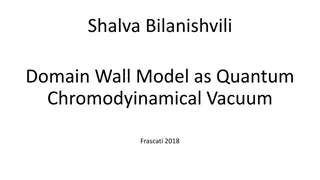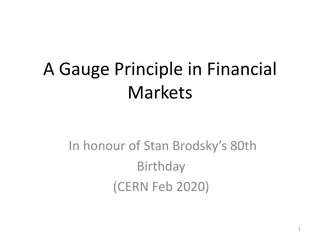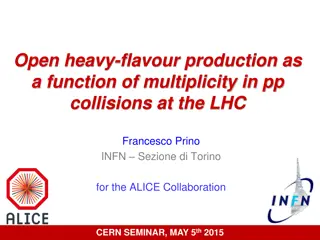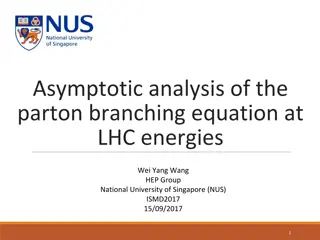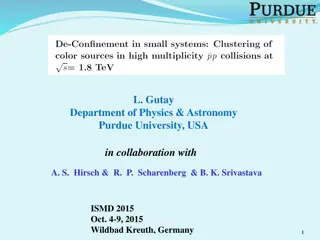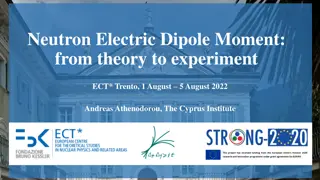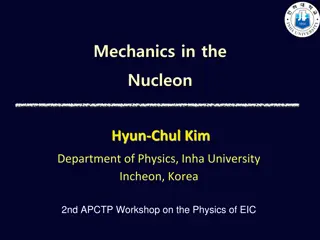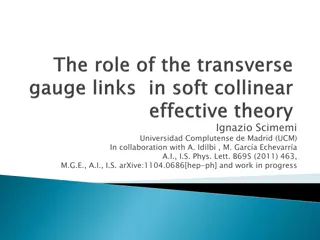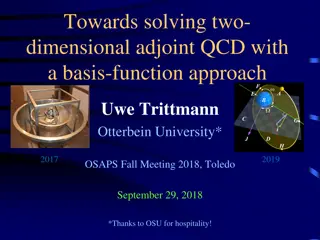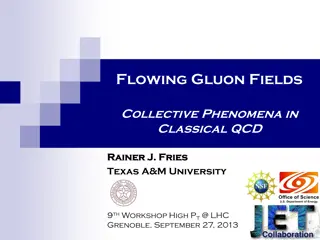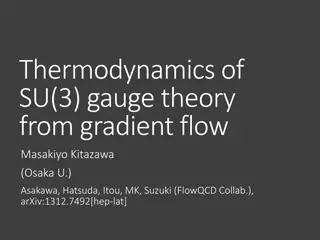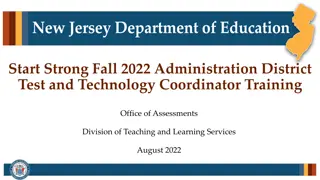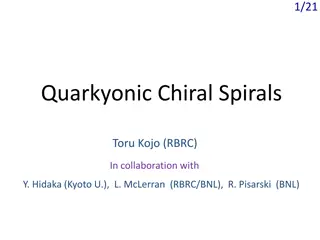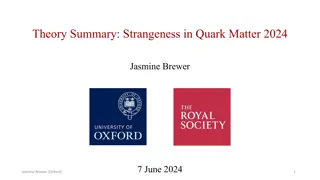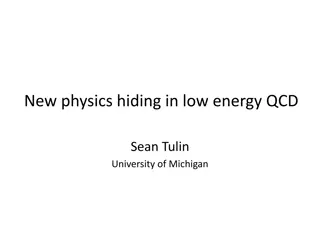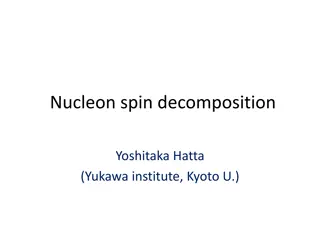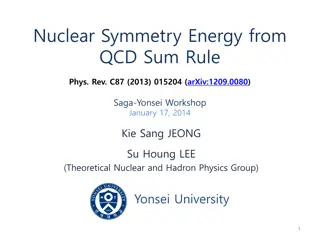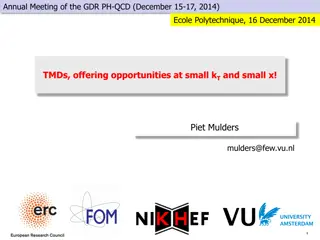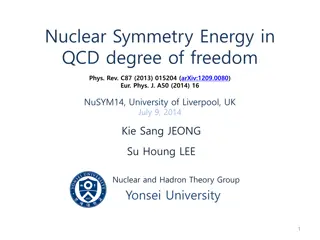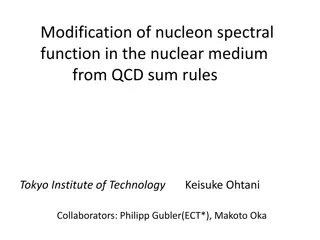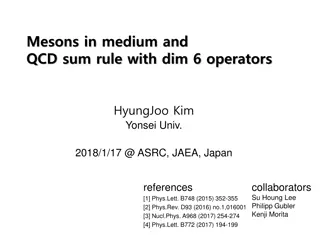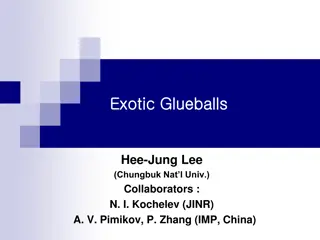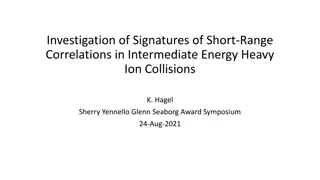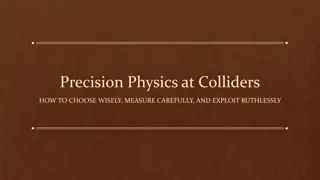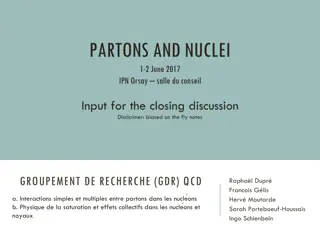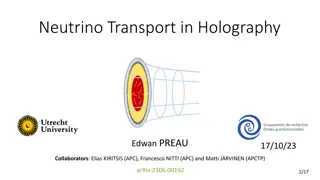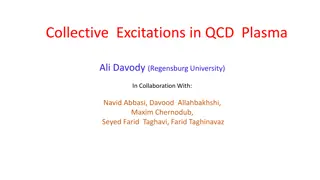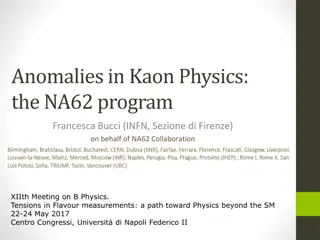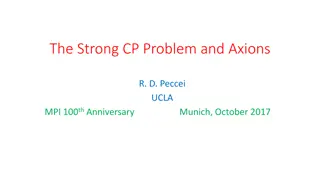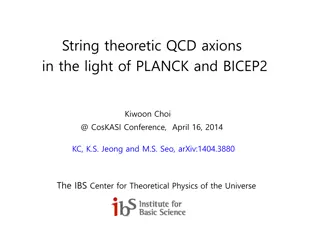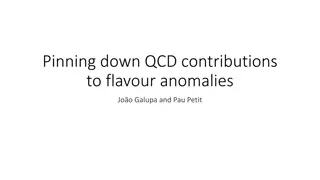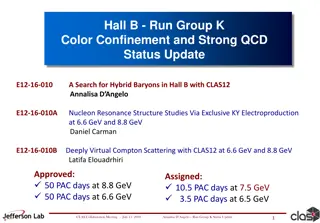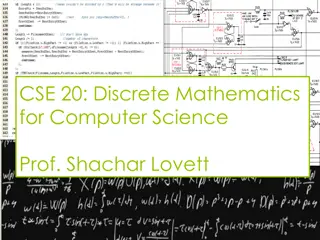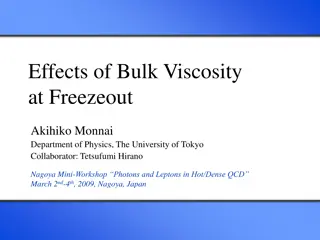Quantum Chromodynamics and Effective Potential in Vacuum Physics
Delve into the intricacies of Quantum Chromodynamics and the concept of effective potential in the context of vacuum physics. Discover how quarks, leptons, photons, W and Z bosons, gluons, and the Higgs boson play crucial roles in shaping the fundamental structures of the quantum vacuum. Explore the
2 views • 11 slides
Insights into Covariant Derivative in Financial Markets & Quantum Field Theory
Explore the applicability of covariant derivatives in differential geometry, financial markets, and QCD. Understand the concept of fibre bundles, connections, and related structures through insightful examples and discussions. Discover the role of covariant derivatives in moving between neighbouring
0 views • 16 slides
Strong vocational interest blank
Strong Vocational Interest Blank, introduced in 1927 by Edward Kellog Strong Jr., assesses individuals' career preferences based on their likes and dislikes across various dimensions. The Strong-Campbell Interest Inventory, a revised version, includes 124 occupational scales and 23 Basic Interest Sc
0 views • 12 slides
Open Heavy-Flavour Production in pp Collisions at the LHC - Physics Seminar Overview
Physics seminar presentation by Francesco Prino on open heavy-flavour production as a function of multiplicity in pp collisions at the Large Hadron Collider (LHC). The talk covers the motivation behind studying heavy-flavour production mechanisms, data analysis techniques, results on the multiplicit
1 views • 65 slides
Insights into Parton Branching Equation at LHC Energies
Multiplicity distributions play a crucial role in understanding the cascade of quarks and gluons at the LHC energies, revealing underlying correlations in particle production. Popular models like Monte Carlo and statistical models are used to describe the charged particle multiplicity distributions.
1 views • 17 slides
Investigation of QGP Formation at Fermi Lab CO Collider
Investigation led by L. Gutay at Purdue University, in collaboration with other researchers, presented evidence for de-confinement in high-energy collisions. The E-735 experiment at 1.8 TeV utilized advanced detectors and percolation theory to analyze multiparticle production, showcasing a potential
3 views • 20 slides
Workshop on Neutron Electric Dipole Moment: Theory to Experiment
Workshop on Neutron Electric Dipole Moment: Theory to Experiment will be held in Trento from August 1st to August 5th, 2022. The event aims to bridge the gap between theory and experiment in investigating the neutron EDM in Lattice QCD, Phenomenology, and Cosmology. Renowned speakers and financial s
1 views • 10 slides
Nucleon Structure: Insights from EIC Workshop
Exploring the mechanics of nucleons and the physics goals of the Electron-Ion Collider (EIC), this content delves into the origin of nucleon mass and spin, emergent properties of dense gluon systems, and energy-momentum tensor in QCD. It discusses the role of gluons in understanding nucleon structur
1 views • 31 slides
SCET: Effective Theory of QCD
SCET, a soft collinear effective theory, describes interactions between low energy, soft partonic fields, and collinear fields in QCD. It helps prove factorization theorems and identifies relevant scales. The SCET Lagrangian is formed by gauge invariant building blocks, enabling gauge transformation
1 views • 38 slides
Algebraic Solutions for Two-Dimensional Adjoint QCD
Two-dimensional adjoint QCD is explored with a basis-function approach aiming to achieve single-particle states over cluttered multi-particle states. The algebraic solution involves t'Hooft-like integral equations and pseudo-cyclicity considerations to address parton number violation and boundary co
1 views • 22 slides
Flowing Gluon Fields and Color Glass Phenomena in QCD
Explore the collective phenomena of gluon fields in classical QCD, focusing on the Standard Model of URHICs, Color Glass, and Gluon Fields in the Forward Lightcone. The research delves into topics like local thermal equilibrium, viscous hydrodynamics, and the interaction of probes with quarks and gl
0 views • 24 slides
Exploration of Thermodynamics in SU(3) Gauge Theory Using Gradient Flow
Investigate the thermodynamics of SU(3) gauge theory through gradient flow, discussing energy-momentum stress pressure, Noether current, and the restoration of translational symmetry. The study delves into lattice regularization, equivalence in continuum theory, and measurements of bulk thermodynami
0 views • 40 slides
Start Strong Fall 2022 Administration District Test Coordinator Training
Delve into the comprehensive training agenda for the Start Strong Fall 2022 Administration, focusing on key aspects such as testing requirements, technology setup, reporting groups, accessibility features, and more. Understand the differences between Start Strong and NJSLA assessments, key dates, an
0 views • 58 slides
Quarkyonic Matter and Chiral Pairing Phenomena
Investigate the characteristics of quarkyonic matter and chiral pairing phenomena in the context of dense QCD at T=0. Delve into the confinement aspects, the properties of quarkyonic matter near T=0, and the candidates for chiral symmetry breaking. Consider the implications of chiral pairing phenome
0 views • 42 slides
Exploration of Critical Points in Quark Matter by Jasmine Brewer
Explore the theoretical perspectives on strangeness in quark matter as discussed by Jasmine Brewer from Oxford. The presentation delves into the search for the QCD critical point, dynamics of heavy flavor hadronization, and more, highlighting challenges and future opportunities in the field.
0 views • 21 slides
CP Violation in Low-Energy QCD: New Physics Perspectives
Investigating CP violation in low-energy QCD, this presentation by Sean Tulin from the University of Michigan delves into the sensitivities of decays to new physics, focusing on CP violation beyond the Standard Model and the potential existence of new weakly-coupled light forces hiding under QCD. Di
1 views • 37 slides
Nucleon Spin Decomposition and Proton Spin Problem
Explore the complex realm of nucleon spin decomposition and the enigmatic proton spin problem, delving into concepts like orbital angular momentum, quarks and gluons' helicity, and longitudinal double spin asymmetry in polarized deep inelastic scattering. Learn about the spin crisis, gluon polarizat
0 views • 26 slides
Nuclear Symmetry Energy with QCD Sum Rule
This study delves into the concept of nuclear symmetry energy through the lens of QCD Sum Rule, discussing its implications in Rare Isotope Accelerator Plan and nucleon-nucleus scattering. Utilizing mean field approximation and Borel transformation, the research aims to understand asymmetric nuclear
0 views • 21 slides
Exploring Transverse Momentum Distributions (TMDs) at the GDR PH-QCD Annual Meeting
The Annual Meeting of the GDR PH-QCD focused on discussing Transverse Momentum Distributions (TMDs) and their significance at small kT and small x values. Topics covered include gauge-invariant correlators, PDFs, and PFFs, as well as the utilization of color gauge links in describing partonic transv
1 views • 33 slides
Nuclear Symmetry Energy in QCD Degree of Freedom
Understanding the nuclear symmetry energy in the context of Quantum Chromodynamics (QCD) is essential for nuclear phenomenology. This study explores topics such as QCD sum rules, mean field approximation, and operator product expansion to decipher the energy properties of nuclear systems. The resear
1 views • 15 slides
Modification of Nucleon Spectral Function in Nuclear Medium from QCD Sum Rules
Investigating the modification of nucleon properties in the nuclear medium using QCD sum rules, focusing on hadron properties, mass spectrum, and chiral symmetry restoration. The study discusses the mass differences, non-perturbative contributions, and the analysis of QCD sum rule in nuclear matter.
0 views • 27 slides
Mesons in Medium and QCD Sum Rule with Dim-6 Operators
Study of mesons in medium and their behavior using QCD sum rule with dim-6 operators, exploring mass shifts, broadening, and indicators of quark-gluon plasma. Specifically focuses on charmonium sequential dissociation and non-perturbative methods in QCD such as lattice QCD and Dyson-Schwinger equati
0 views • 27 slides
Exotic Glueballs and Hadrons in QCD Sum Rule
Delve into the world of exotic glueballs and hadrons through a review of QCD sum rule, investigation of light scalar mesons, and discussion on hadrons with unconventional quantum numbers. Learn about theoretical frameworks and calculations involving correlators, dispersion relations, Borel transform
1 views • 32 slides
Investigation of Short-Range Correlations in Heavy Ion Collisions
Short-range correlations in nuclei play a crucial role in understanding the properties of nuclear wave functions and the transition from baryonic to quark-gluon degrees of freedom. Early theoretical work emphasized the importance of short-range correlations, particularly in modeling the nucleon spec
0 views • 17 slides
Precision Physics at Colliders: Choosing Wisely, Measuring Carefully, and Exploiting Ruthlessly
Precision Physics at Colliders explores the selection, measurement, and utilization of data at colliders, focusing on fundamental symmetries and parameters of the Standard Model. The lectures cover topics such as QCD, top, electroweak, and flavor physics, emphasizing the importance of precision meas
1 views • 42 slides
Parton and Nucleon Interactions in Hadronic Collisions
Discussions at the GDR QCD workshop covered a range of topics from double parton scattering to coherent processes on nuclei, emphasizing the importance of understanding parton interactions in both proton-proton and heavy ion collisions. Theoretical frameworks such as DPS, SPS, GPDs, and TMDs were ex
1 views • 12 slides
Neutrino Transport in Holography Research Study
This research study delves into the realm of neutrino transport in holography, focusing on the interaction of neutrinos with dense QCD matter in the core. Motivations, formalisms, holographic set-up, and the holographic correspondence are explored using a toy model of quark matter in 4SYM and utiliz
1 views • 32 slides
Collective Excitations in QCD Plasma: Hydrodynamic Regime Overview
This research presentation by Ali Davody and collaborators from Regensburg University explores collective excitations in QCD plasma, focusing on chiral hydrodynamics, magnetic and vortical waves, hydrodynamic excitation descriptions, and modes derived from kinetic theory. The study delves into the d
0 views • 33 slides
Insights into Kaon Physics: Unraveling Anomalies and New Discoveries
Delve into the world of Kaon Physics, from the historical discoveries like CP violation to modern experiments testing fundamental symmetries. Explore anomalies challenging the Standard Model and the implications for new physics models. Discover the interplay of QCD and EW penguin contributions, unce
0 views • 27 slides
Strong Support, Strong Futures NDIS Provider Brisbane Righteous Community Care
Strong Support, Strong Futures NDIS Provider Brisbane Righteous Community Care
0 views • 6 slides
The Strong CP Problem and Axions
In the realm of quantum chromodynamics, the strong CP problem and the role of axions are explored, shedding light on the U(1)A problem and its resolution. The content delves into the dynamics of quark condensates, Nambu-Goldstone bosons, and lattice QCD calculations unveiling the absence of U(1)A sy
0 views • 48 slides
Semi-inclusive lepton jet function
Consider a world without QCD, where particles can be observed as non-singlets in an electroweak gauge theory. Explore the differences between QCD jet functions and leptonic jet functions, focusing on non-singlet contributions and the factorization of 2-jettiness using SCET. Address issues like rapid
0 views • 18 slides
String theoretic QCD axions in the light of PLANCK and BICEP2
This presentation discusses the implications of string theoretic QCD axions in the context of cosmological constraints. It explores the strong CP problem, axion solutions, physical properties of axions, and mechanisms for generating the axion scale. Issues such as the global U(1)PQ symmetry and astr
0 views • 22 slides
Pinning Down QCD Contributions to Flavour Anomalies
This study delves into flavour anomalies, exploring the implications of the observed deviations and the role of QCD effects. Through detailed analyses of transition matrix elements and dressed vertices, the investigation sheds light on the potential influence of new particles outside the Standard Mo
0 views • 11 slides
Color Confinement and Strong QCD Status Update for Hybrid Baryons Research
Explore the latest updates on research related to color confinement, strong QCD, and the search for hybrid baryons in Hall B. Details include studies on nucleon resonance structure, exclusive KY electroproduction, and deeply virtual Compton scattering using CLAS12 at varying energies. Get insights i
0 views • 11 slides
Quark-Gluon Dynamics in High-Temperature QCD Studies
Dive into the exploration of quark-gluon dynamics in high-temperature QCD studies. Discover insights on hadron disappearance, the success of HRG models for cumulants, and the transition to chiral states near critical temperatures. Detailed analyses of quark propagators, soft modes of chiral transiti
0 views • 22 slides
Discrete Mathematics for Computer Science - Strong Induction Examples
Explore strong induction examples in discrete mathematics for computer science, covering topics such as divisibility by a prime, recursion sequence, and product of fractions. Understand the difference between strong and regular induction, with detailed proofs and examples showcasing the power of str
0 views • 33 slides
Exploring Elementary Particle Dynamics and Forces
Dive into the fascinating world of elementary particle dynamics, studying the four fundamental forces - strong, electromagnetic, weak, and gravitational. Learn about Quantum Electrodynamics (QED) and Quantum Chromodynamics (QCD), unraveling the mysteries of particle interactions and quantum behavior
0 views • 9 slides
NLO QCD Corrections in Inclusive Bc* Production
Discover the NLO QCD corrections in inclusive Bc* production within Z0 decays, including background information on Bc mesons, direct and indirect production methods, motivation behind the research, calculation divergences, and IR in one-loop diagrams. Explore the latest advancements and theoretical
0 views • 16 slides
Bulk Viscosity Effects at Freezeout in Hot/Dense QCD Matter
Explore the impact of bulk viscosity at freezeout in hot/dense QCD matter through ideal and viscous hydrodynamics at the Nagoya Mini Workshop. Topics covered include quark-gluon plasma, Cooper-Frye formula, kinetic theory, and numerical results. The study highlights the importance of understanding t
0 views • 22 slides
